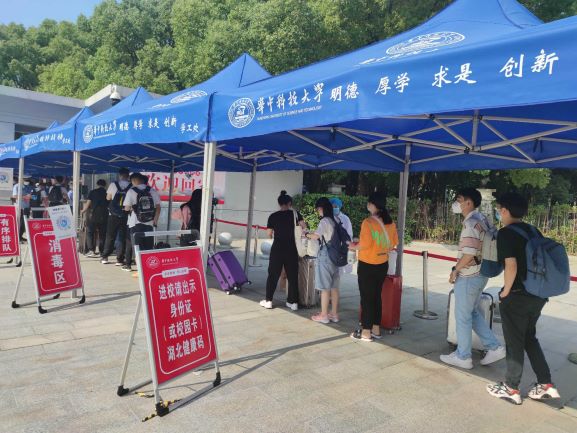A different graduation season: Chinese college students moves graduation online
By Cheng Yuanzhou, People’s Daily
Students of the Huazhong University of Science and Technology in Wuhan wait to enter the campus, June 8. The first batch of college students begin to go back to campus in Wuhan since June 8. Photo by Li Changlin/People’s Daily Online
The 8.74 million college graduates in China are facing a different graduation season this year, as the COVID-19 epidemic is moving everything online, from graduation photo shooting, to job seeking, and to thesis defense.
To ensure on-time graduation, Chinese graduates must overcome a series of challenges. Meanwhile, they are gaining more experiences and growth. Facilitated by a slew of measures rolled out by both the country’s education ministry and local governments, they feel the meticulous care from their schools and the society.
“We can still recognize ourselves in the photo, right?” Said Zhao Mengmeng, who’s about to graduate from Central China Normal University (CCNU), pointing to a cartoon-version graduation photo created by an application in which she and her schoolmates were smiling brightly in “hand-painted” bachelor uniforms at the gate of their university.
Finishing the online graduation photo “shooting,” Zhao came to the very end of her college life – to go back to the campus for the graduation checkout.
As COVID-19 cases subsides in China, students from multiple universities in Wuhan, including the CCNU, are allowed to go back to schools in batches after June 8. They can live in the dorms after their health codes and nucleic acid test results are verified, and each room accommodates one student.
Zhao’s thesis defense, interview of postgraduate entrance exam, as well as job interviews were all completed online. She spent most of her time during the past over four months in front of a computer. She said she had been worried before the online thesis defense, but it went very well. The “cloud thesis defense,” in which teachers and students were separated by the screens, according to Zhao, were somewhat warming.
To help students better finish their theses, guarantee the quality of theses and defense, as well as ensure on-time commencement, the CCNU established an online thesis platform and opened multiple electronic data bases. So far, all of the university’s 4,400 undergraduates have completed online thesis defense.
Apart from defending the thesis, Zhao had to prepare for the interview of postgraduate entrance exam and online job interviews.
“I applied for about 70 jobs, and received 5 offers,” Zhao told the People’s Daily. However, thanks to the enrollment expansion of postgraduate students this year, she has been admitted to the South China Normal University.
Zhao is only one of the 317,000 college graduates in Wuhan facing the special graduation season. The COVID-19 pandemic forced many to postpone their plans to study abroad, and also exerted huge pressure on those seeking a job, Zhao said.
Wang Lu, an instructor with the CCNU’s School of Fine Arts, facilitated 195 students with their graduation affairs. “I totally understand your worries, anxiety, helpless and hesitation. But I firmly believe that these feelings are temporary, and you will be able to cope with them,” Wang, a qualified psychologist and senior career planner, told her students in a letter, as she deeply knew the importance of psychological guidance. To relieve the pressure of the students, she also offered online consulting service for them. “To ensure on-time graduation of the students is our achievement in combating the COVID-19 epidemic,” she said.
Seeing the outstanding performance of the grid-control measures in epidemic response, Wang established a four-party grid on online platforms involving instructors, student leaders, liaisons and students, so as to have a timely grasp of the students’ situations and difficulties they faced.
Learning that the father of a student in poor economic status was diagnosed with COVID-19, Wang immediately help the student apply for a special subsidy to the university.













